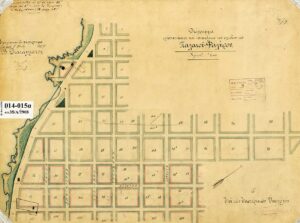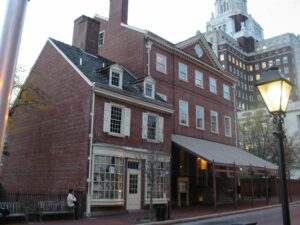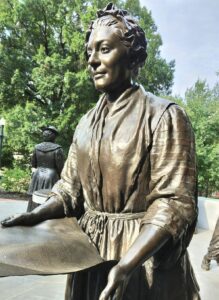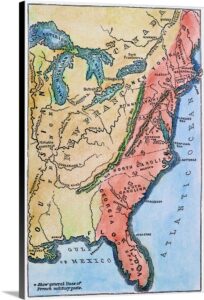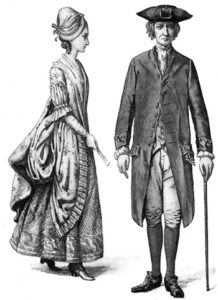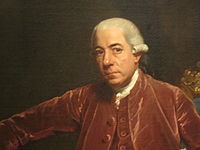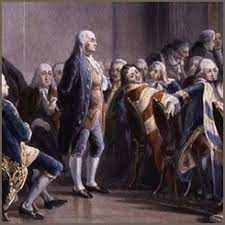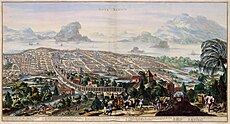Americanism Redux
March 21, your today, on the journey to the American Founding, 250 years ago, in 1774
(the Virginia bluebells)
Take a walk in these first spring days and you’ll see the early flowers, the Virginia bluebells. Delicate yet hardy, they are the flowers of aspiration.
An aspiration differs from hope. It looks ahead with sharper eyes, seeing both considered plan and imagined end.
Will your aspiration survive the spring?
* * * * * * *
(one of many)
Every fruit-tree planter has aspirations.
William Bartlett has a new lease on 125 acres in Berkeley, in the far western region of the colony of Virginia. He’s signed the agreement today, 250 years ago. He knows what he wants to do next: plant a hundred peach trees and a hundred winter apple trees. Actually, it’s part of the lease agreement with George Washington. Bartlett’s aspiring orchard is set to be the first of its kind in this part of Virginia. If it succeeds with a harvest, loads of peaches and apples will be heading toward Washington’s Mount Vernon plantation on Potomac River in a few months.
Bartlett’s is a life of aspiration hinging on factors beyond his control.
* * * * * * *
(you start with the lines…)
Planting new towns is equally aspirational.
Today, 250 years ago, thanks to the efforts of John Davidson, among others, the town of Charlotte is now Mecklenburg County’s seat of government in the colony of North Carolina. Davidson followed a familiar path to upward mobility—he married well, having convinced Violet, the daughter of a wealthy father to become his wife. Davidson, a trained blacksmith, used his wife’s family connections to become a justice of the peace and elected member of the colony’s legislature. Davidson aspires to be a public leader in this new center of county government.
Daniel Stoy isn’t as well-connected as Davidson but the English-Scottish immigrant has obtained 300 acres of land along the Pennsylvania Road in Somerset County, colony of Pennsylvania. It’s far too early to think about where the local government will be, though Stoy will do the next best thing—he’ll call his land Stoystown, an aspirational decision if there ever was one. Next on the list will be to attract other settlers and maybe a store or tavern.
New county town in one colony and new county seat in another colony. Stoy and Davidson share a vision of aspiration that stability and an absence of war have made reality.
* * * * * * *
(City Tavern–I hope it reopens)
Plenty of aspiration fills the air in Philadelphia’s City Tavern. The investors who’ve paid for the place have hired Daniel Smith to be its chief operator and manager. Smith is advertising 250 years ago this week that he has installed tasteful private overnight rooms, opened a “genteel coffee house”, collected the latest and best American and English newspapers and magazines for reading, and is offering “fine wines and a larder”, the latter for cold storage of food and drinks.
Smith is unabashed in his aspiration: he wants City Tavern to be the most popular gathering-spot in the colonies for eating, drinking, talking, resting, celebrating…and debating.
* * * * * * *
(oconee bells)
Outside Mrs. Swallow’s Tavern are Charleston’s first flowers of spring, the clumps of oconee bells, in the colony of South Carolina. Inside Swallow’s Tavern is a group of celebrators offering toasts to mark the nine-year anniversary of the Stamp Act’s repeal by Parliament. In some tankards you’ll taste ale, in some glasses you’ll sip punch, but in every container you’ll smell a strong whiff of aspiration—the belief that Parliament, as with the Stamp Act almost a decade before, will repeal the Tea Act and return imperial-colonial relations to a calmer state. There’s a similar celebration in New York City of the ninth anniversary of the Stamp Act’s repeal, with cups and hopes held high that a replay of lowered tensions will be true again between England and colonies. Who knows if their aspiration will outlive the dutchman’s breeches which have just started to flower along the Hudson River. They spring eternal.
* * * * * * *
(trout lilies)
Every flower of early spring faces the same threat no aspiration can withstand. A sudden burst of winter, a season that just won’t let go, can bring snow, sleet, and killing temperatures. The British imperial governor of North Carolina, Josiah Martin, is in an icy mood after reading the elected Assembly’s latest version of organizing the superior-court system in the colony of North Carolina. Martin orders Assembly members—the legislature of the colony—to provide an explanation of the proposed law that, the governor flatly states, violates instructions from King George III. The judicial dispute and problem began last fall and seems to defy resolution.
Away from the fractious capital of New Bern, the early trout lilies are up and blooming in the woods of Charlotte and Mecklenburg County.
Unless one side withdraws or disintegrates, compromise is the only way forward when aspirations collide.
* * * * * * *
(it’s her decision)
Aspirations are about the future, the things pursued and yet to happen.
Two writers in the colony of Virginia peer into the future. They see a war but not the same war. They see implications but not the same implications. They do, however, see the same outlet for their ideas. They want the first woman to manage a colonial media publication to print their points of view.
One writer is “Virginius”. Virginius calls for pre-emptive war against Native tribes in the western parts of the colony and beyond. The signs of a terroristic massacre of civilians are evident, Virginius states, and the “first object of Government” is to protect its people. Invade the Natives now, is the demand of Virginius. Our safety is at risk.
The other writer has no name. This writer asserts that war has produced the currently heavy load of imperial taxes and imperial policies. The best way to reduce the burden is for the British government to stay out of foreign wars. The writer warns an existing war in Poland could tempt British policymakers to intervene. Don’t go into Poland, is the demand of the unnamed writer. Our burdens can’t take it.
Clementina Rind agrees to make both essays public in her newspaper, “Virginia Gazette.” Her aspiration for the Gazette: “Open to ALL PARTIES but influenced by NONE.”
* * * * * * *
(target for the network)
The flowers of early spring began as seeds planted in the soil, carried by the wind or left by the birds. The carry-and-leave nature of nature feels like the plan under discussion today, 250 years ago, for a new colonial network of postal offices and deliveries along the continent’s seaboard.
Groups in several colonies are talking about how to replace the “parliamentary” network with a “constitutional” network. The overtones are loud—supporters of colonial rights cannot trust an imperial postal system to pass along controversial writings and information. Publications like Clementina Rind’s “Virginia Gazette” would be in danger of shut-down beyond the reach of hand-to-hand distribution.
The effort will need money from subscribers to turn aspiration into outcome.
* * * * * * *
(the “Friend’s topic)
“A Friend To Posterity” lives in the colony of Connecticut and, like the two colonial Virginia writers, sees a specific source of current problems.
It’s men. Or rather men who increasingly ignore women.
“Friend” believes men have damaged colonial society by not interacting enough with women. Recent past and ancient past tell the same story, in the opinion of “Friend.” The record of ancient Rome and Greece as well as later trends in France and Spain all point to this fundamental truth, according to “Friend.” The wreckage from men ignoring women is everywhere: virtue is less, manners are weakened, and patriotism is dead.
“Friend” aspires for society to shake off the trend and return to a healthier, mutual balance between men and women.
* * * * * * *
(bloodroot)
The early white flowers of bloodroot can be seen here and there around the town green of Lyme, a coastal village in the colony of Connecticut. People walking onto the green see a circle of grayish-black ash on the ground. That’s the remains of 100 pounds of dried tea brought to Lyme by William Lamson on horseback. A crowd burned the stuff here a few days ago.
They delivered an unmistakable message with the fire and smoke: we stand for colonial rights and we oppose imperial intrusion.
Perhaps someone walking today can poke through the ashes and find an aspiration.
Also
(Earl of Chatham)
In London the Earl of Chatham, a popular figure among the people who support colonial rights, has written to a friend that Boston should be given a chance pay for damages done to the property (tea) of the British East India Company. Should Boston refuse, Chatham realizes the British government has the power to punish the community, but he fears the imperial government might go too far and seek to root out colonial liberties. Chatham’s aspiration is to find effective, moderate leaders. He’s compelled to ask, “But where is the casting voice in this great business?”
* * * * * * *
(Henry Laurens)
In his extended visit to London, Henry Laurens admires Chatham’s British leadership back during the French and Indian War. Though he’s unaware of Chatham’s views on Boston today, Laurens is already acting on Chatham’s suggestion about repayment. Laurens is a native of Charleston, colony of South Carolina and has instructed his financial agent to pay an amount for any damages done to the tea in Charleston’s local protest. Laurens regards repayment as an acceptable next step in his aspiration to lower imperial-colonial tensions.
* * * * * * *
(Franklin abused in London media for this moment earlier in 1774)
Also in London is Benjamin Franklin. He offers an observation on English media culture that complicates efforts to mend imperial-colonial relations: “You know that in England, there is every day in about every (news)Paper some Abuse on Public Persons of all Parties, the King himself does not always escape; and the Populace, who are used to it, love to have a good Character cut up now and then for their Entertainment.”
Aspirations may need to work around culture.
* * * * * * *
(Marquis de Condorcet, recipient of Franklin’s replies)
When he’s not lamenting the state of English media culture, Franklin is writing answers to questions posed to him by his friend Marquis de Condorcet of Paris, France. Condorcet is curious about America and any differences between the Old and New Worlds. Franklin’s replies include: no, flint doesn’t seem to be an American natural resource, though “ancient Inhabitants” might have found such deposits; no, volcanos do not exist in America; and yes, free black men and women live among white people. Franklin adds that he has seen a natural gift for music among free black people—an interesting note for Condorcet in music-loving Paris—while hinting that they are unfairly blocked from education, which accounts for poverty and distress.
Franklin’s aspiration, one of many, is a favorable comparison of America to Europe.
* * * * * * *
(Mexico City)
Franklin didn’t know it but today, 250 years ago, the first poorhouse appears today in New Spain, in Mexico City. It is a place where up to 250 people who volunteer to live there can work and reside, free of charge. It is roughly a century after the concept originated in England, and in New England.
For You Now
(our early spring)
The first days of spring are perfect for aspirations. Looking ahead you see more spring, more green and growth. Beyond it you see the full lushness and warmth of summer. Even into the fall from the vantage point of early spring, you envision richly colored leaves and slightly crisp air. The bareness and coldness of late autumn and early winter are not part of the horizon. You can aspire to the rest of the year when you’re in early spring.
250 years ago the aspirations of early spring have, like migrating birds, returned once more. The people of that time aspire to gardens, to fields, to births among the livestock, to iceless streams and lakes full of fish, to somewhat easier travel over land and sea. Some of the people also aspire to new stages of their lives.
And to new stages of the community and world around them.
I don’t know about you, but I’m intrigued by one of those out-of-the-way aspects of Redux in today’s entry. I’m referring to the initial plans for replacing the “parliamentary” postal system with a “constitutional” version. Those advocating for the change see a need for shared ideas and connective knowledge. They know that information, like anything else, can be detained or derailed. Their selection of the descriptive term “constitutional” suggests an understanding of the relationship between item existing (the contents of a newspaper), the item carried (via the post) and the item received (at its destination). You need to have faith in the entire chain. An essential aspiration.
Like your faith in the flowers of early spring.
Suggestion
Take a moment to consider: which is more compelling for you this year—an aspiration for yourself or for the American nation?
(meanwhile, on the river bank)


